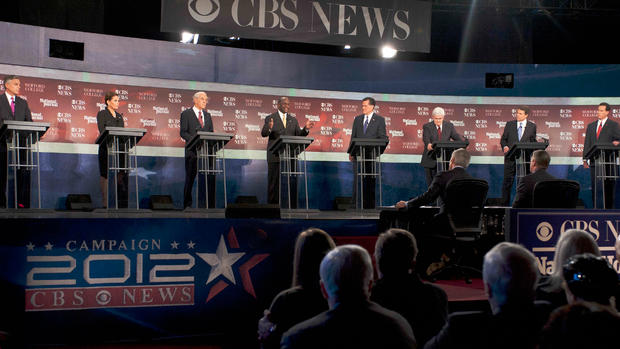Cain, Bachmann say they would support waterboarding
Republican presidential candidates Herman Cain and Michele Bachmann said at the CBS News/National Journal presidential debate on Saturday night that they would support the renewed use of waterboarding, which Cain said he did not consider a form of torture.
Ron Paul and Jon Huntsman strongly disagreed with the practice.
The discussion was prompted by an email question from a Stephen Schafroth in Oregon who wrote: "I served on an aircraft carrier during the Vietnam War. I believe that torture is always wrong in all cases. What is your stance on torture?"
While Cain maintained he was against torture, he said he would call on the "judgment of our military leaders to determine what is torture and what is not torture." Cain says he does not consider waterboarding to be torture - and instead called it an "enhanced interrogation technique."
The U.S. acknowledged waterboarding terror suspects following 9/11, but prohibited the practice in 2006. When President Obama took office, he banned all "enhanced interrogation techniques."
Bachmann also said she'd be willing to allow waterboarding if elected president, calling the practice "very effective."
"It gained information for our country," Bachmann said.
Transcript of the debate
Full video
Full coverage: The CBS News/National Journal debate
However, Ron Paul vehemently disagreed, declaring that "water boarding is torture" and "torture is illegal" by both U.S. and international laws. He called the practice of water boarding both "immoral" and "impractical," questioning the effectiveness of such techniques.
"Why would you accept the position of torturing a hundred people because you know one person might have information?" Paul said. "It's really un-American to accept, on principle, that we will torture people that we capture."
Huntsman also disagreed with the practice, while invoking the brand and values of the United States.
"We diminish our standing in the world and the values that we project, which include liberty, democracy, human rights and open markets, when we torture," Huntsman said. "We lose that ability to project values that a lot of people in corners of this world are still relying on the United States to stand up for."
Rick Perry denounced torture but alluded to his approval of so-called enhanced interrogation, saying he is for the use of any techniques to "save young American lives."
"This is war," Perry said. "That's what happens in war. "
Neither candidate mentioned waterboarding.
The eight Republican candidates were at Wofford College in South Carolina on Saturday for the "commander-in-chief debate," sponsored by CBS News and National Journal. The debate, moderated by CBS Evening News anchor Scott Pelley and National Journal congressional correspondent Major Garrett, focused on foreign policy and national security.
Romney, Gingrich at GOP debate: We'd go to war to keep Iran from getting nuclear weaponsPerry: My foreign aid budget starts at zero
Gingrich, Romney back Obama killing American accused of turning on U.S.
:
GOP candidates on Pakistan: Friend or foe?
Perry: All countries start at zero foreign aid
Bachmann on increasing military spending
Cain on dealing with the Arab Spring
Post-debate analysis with CBS News political director John Dickerson
